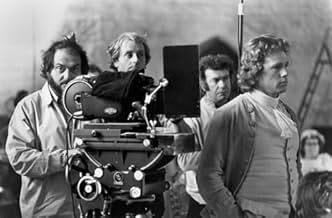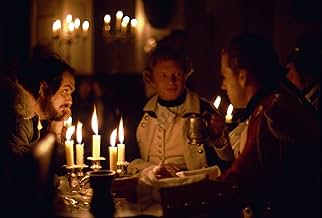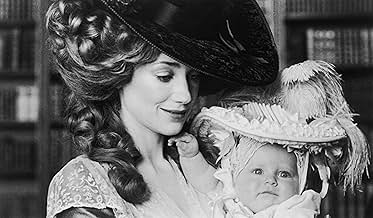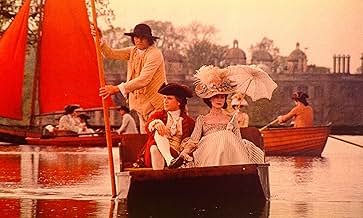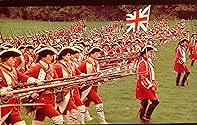Barry Lyndon
- 1975
- Tous publics
- 3h 5m
An Irish rogue wins the heart of a rich widow and assumes her dead husband's aristocratic position in 18th-century England.An Irish rogue wins the heart of a rich widow and assumes her dead husband's aristocratic position in 18th-century England.An Irish rogue wins the heart of a rich widow and assumes her dead husband's aristocratic position in 18th-century England.
- Director
- Writers
- Stars
- Won 4 Oscars
- 17 wins & 14 nominations total
Hardy Krüger
- Capt. Potzdorf
- (as Hardy Kruger)
Diana Körner
- Lischen - German Girl
- (as Diana Koerner)
André Morell
- Lord Gustavus Adolphus Wendover
- (as Andre Morell)
- Director
- Writers
- All cast & crew
- Production, box office & more at IMDbPro
Summary
Reviewers say 'Barry Lyndon' is acclaimed for its breathtaking cinematography, intricate period details, and masterful use of natural light, often likened to fine art. It explores themes of human folly, the quest for wealth and status, and the resulting downfall. However, some criticize its slow pace, the perceived lack of emotional depth in characters, especially Ryan O'Neal's performance, and its lengthy runtime. Despite these drawbacks, many regard it as a significant artistic achievement and a standout in Kubrick's oeuvre.
Featured reviews
The beauty, the depth, and the mystery of this film are unsurpassable - what Kubrick was doing with light is just a miracle. Special lenses were designed to shoot interiors and exteriors in natural light. In one scene Barry (Ryan O'Neil) was having a dinner with a German woman who was feeding her baby and the candle light made the whole scene look like a Caravaggio's painting. This is just one of many scenes. Each of them is perfection and harmony. Costumes and sets were crafted in the era's design. Age of Enlightenment with its gallantry, wars, and duels, had been recreated in the film with the precision of the celebrated landscape and portrait masters of the period such as Thomas Gainsborough; Sir Joshua Reynolds, founder of the Royal Academy of Arts; George Romney to name just a few. If nothing else, watching BL is pure aesthetic delight - and there is one man who responsible for it, Stanley Kubrick. If ever divine film was made, "Barry Lyndon" was it and Kubrick could've quoted the Bible - "God looked at everything he had made, and he found it very good".
I've read the comments and articles that call "Barry Lyndon" cold, slow, boring, "the collection of pretty pictures', "flawed" masterpiece, and the most ridiculous one, "glittering ornament with a hollow center". I simply can't understand it. "Barry Lyndon" is the most compelling and compassionate realization of the inevitable finality of everything in this world which was presented by the visionary director with elegant sensual melancholy. Stanley Kubrick known for his detached, seemingly remote and non-sentimental style chose to reach out to his viewer directly during the epilogue, "It was in the reign of George III that the aforesaid personalities lived and quarreled, good or bad, handsome or ugly, rich or poor, they are all equal now". I don't recall any other movie that would illustrate the old wisdom, "everything will pass" in such sublime and deeply moving way.
I've read the comments and articles that call "Barry Lyndon" cold, slow, boring, "the collection of pretty pictures', "flawed" masterpiece, and the most ridiculous one, "glittering ornament with a hollow center". I simply can't understand it. "Barry Lyndon" is the most compelling and compassionate realization of the inevitable finality of everything in this world which was presented by the visionary director with elegant sensual melancholy. Stanley Kubrick known for his detached, seemingly remote and non-sentimental style chose to reach out to his viewer directly during the epilogue, "It was in the reign of George III that the aforesaid personalities lived and quarreled, good or bad, handsome or ugly, rich or poor, they are all equal now". I don't recall any other movie that would illustrate the old wisdom, "everything will pass" in such sublime and deeply moving way.
In the midst of the many wonderful films made by Stanley Kubrick, it is strange to note how rarely people mention "Barry Lyndon".
The film portrays an unusual young Irish man, Redmond Barry, and his endeavours as he is forced to leave his home and tries to make good his life elsewhere. His life away from home starts out as a career in the British Army; only to evolve in surprising ways and lead to as different places as a position of trust within the Prussian Army and later a title of nobility, gained by what our time can only measure as rather disgraceful means.
Some consider Barry Lyndon a slow and tedious film and it is in deed past three hours in length, but this is because of the artistic flow of a film that strays not only to tell a tale about a man who is by no means neither hero nor villain, but also a film which is in no hurry and takes the time for every detail to sink into the mind and heart of the viewer. Some of the scenic images in "Barry Lyndon" are in themselves pieces of art, rendered with a passion for the landscapes and the man-made structures within them.
The myth that all scenes were recorded using no artificial lighting no doubt stems from the very realistic lights during indoor takes, and some of them truly did not feature artificial light. This is but one of the many details that so easily conveys a sense of a realistic portray of the era; the 18th century and the time after the seven-year war in the later half of the century. The impressive atmosphere and the wonderfully picturesque scenarios along with the fact that the entire plot moves at a calm pace makes this film a very pleasant experience.
"Barry Lyndon is", amidst Kubricks' many masterpieces, a film so easily dismissed due to length and the fact that it is overshadowed by others, but I deeply recommend this film to anyone who would like to see a film both for the plot line, the story and the pure enjoyment of the images presented. Stanley Kubrick made many great films and this one is most definitely one of them! KimotoCat
The film portrays an unusual young Irish man, Redmond Barry, and his endeavours as he is forced to leave his home and tries to make good his life elsewhere. His life away from home starts out as a career in the British Army; only to evolve in surprising ways and lead to as different places as a position of trust within the Prussian Army and later a title of nobility, gained by what our time can only measure as rather disgraceful means.
Some consider Barry Lyndon a slow and tedious film and it is in deed past three hours in length, but this is because of the artistic flow of a film that strays not only to tell a tale about a man who is by no means neither hero nor villain, but also a film which is in no hurry and takes the time for every detail to sink into the mind and heart of the viewer. Some of the scenic images in "Barry Lyndon" are in themselves pieces of art, rendered with a passion for the landscapes and the man-made structures within them.
The myth that all scenes were recorded using no artificial lighting no doubt stems from the very realistic lights during indoor takes, and some of them truly did not feature artificial light. This is but one of the many details that so easily conveys a sense of a realistic portray of the era; the 18th century and the time after the seven-year war in the later half of the century. The impressive atmosphere and the wonderfully picturesque scenarios along with the fact that the entire plot moves at a calm pace makes this film a very pleasant experience.
"Barry Lyndon is", amidst Kubricks' many masterpieces, a film so easily dismissed due to length and the fact that it is overshadowed by others, but I deeply recommend this film to anyone who would like to see a film both for the plot line, the story and the pure enjoyment of the images presented. Stanley Kubrick made many great films and this one is most definitely one of them! KimotoCat
10Spleen
In fact it's one of Kubrick's most gripping pictures, with a narrative drive second only to that of "Dr. Strangelove" (and it's unquestionably a more glorious creation than, say, anything he made in the 1950s). English director Michael Powell (while attributing a similar failing to one of his own works) says that Kubrick fell into "the trap of the picturesque", but while I admire Powell as a creator, the judgment is absurd: at the VERY least, each lush image shows us people not just occupying a part of the screen but inhabiting a world, and tells us much about their relation to that world. Many shots are indeed amazing and beguile the eye, but they don't have the effect they do simply because they would make nice postcards.
THIS, I feel sure (without having read Thackeray), is the proper way to adapt a long story from novel to screen. Each scene is either allowed as much time as it needs to make its point and its impact, or it's cut altogether - you won't catch Kubrick skating too quickly over his material for no better reason than to fit it all in. The third-person narration (consisting of witty, beautifully crafted sentences - it's about time I did read Thackeray) almost performs a kind of dance with the images, gliding in just when we need it, taking a step back when we don't. (So rarely is even third-person narration used so well.) And as always, Kubrick's musical sense is unerring. My impression at the time was that I was listening to mid-eighteenth century music that gave way to pieces from the classical era as the hero started to move in higher and higher circles. I was more or less right. But then I noticed Schubert's name in the credits - and I realised with a start that I'd been listening to, had even started tapping my feet to, a Schubert piece I was familiar with, without the anachronism registering.
It's a pity Kubrick stopped making epics after this. Look at the ones he's responsible for: "Spartacus" (not a project Kubrick was fond of, admittedly, but still the most magnificent of all Roman epics) "2001" (the most magnificent of ALL epics), and "Barry Lyndon". The last of the three is by no means a poor cousin.
THIS, I feel sure (without having read Thackeray), is the proper way to adapt a long story from novel to screen. Each scene is either allowed as much time as it needs to make its point and its impact, or it's cut altogether - you won't catch Kubrick skating too quickly over his material for no better reason than to fit it all in. The third-person narration (consisting of witty, beautifully crafted sentences - it's about time I did read Thackeray) almost performs a kind of dance with the images, gliding in just when we need it, taking a step back when we don't. (So rarely is even third-person narration used so well.) And as always, Kubrick's musical sense is unerring. My impression at the time was that I was listening to mid-eighteenth century music that gave way to pieces from the classical era as the hero started to move in higher and higher circles. I was more or less right. But then I noticed Schubert's name in the credits - and I realised with a start that I'd been listening to, had even started tapping my feet to, a Schubert piece I was familiar with, without the anachronism registering.
It's a pity Kubrick stopped making epics after this. Look at the ones he's responsible for: "Spartacus" (not a project Kubrick was fond of, admittedly, but still the most magnificent of all Roman epics) "2001" (the most magnificent of ALL epics), and "Barry Lyndon". The last of the three is by no means a poor cousin.
Martin Scorcese reportedly considers this to be Kubrick's best film. I must agree, and I would say it's his best by some fair margin. I've never seen a film with photography that even begins to approach that in Barry Lyndon. But everyone mentions the photography. The three things that most decisively set this film apart from all of Kubrick's others and really haven't been mentioned enough are its enormous heart, its uncompromising spirit, and the way it seems to suspend time over and over again, simultaneously standing still yet flowing along easily, almost breathlessly. If you watch it expecting A Clockwork Orange or The Shining, you'll be very disappointed and may end up calling it long and boring, but if you set aside an entire evening and surrender yourself totally to its magic, I swear you'll be looking for yourself in Stunland a few hours later. I's time to treat yourself to Barry Lyndon. You may be shocked at discovering what's been there for so long.
Kubrick's adaptation of Thackeray's Barry Lyndon sharply divides fans of the great director's work, as the languid pace and seemingly interminable running time -- not to mention Ryan O'Neal's questionable performance in the title role -- are cherished by some and deplored by others. Little argument will be made against John Alcott's Academy Award-winning cinematography or Ken Adam's production design, however, and Kubrickian motifs are manifest in the gallery of characters' wide-ranging displays of cowardice, guile, duplicity, avarice, jealousy, greed, and cruelty. Marisa Berenson is terribly short-changed in her role as the Lady Lyndon, but a number of other performers are given the opportunity to create a handful of memorable moments -- especially Arthur O'Sullivan (albeit briefly) as the charming, intelligent highwayman and Patrick Magee as the Chevalier. Love it or hate it, Barry Lyndon will remain essential viewing for aficionados of the director, who enjoys taking his usual shots at the more discouraging aspects of human behavior.
Did you know
- TriviaProduction was moved from Ireland to England after writer, producer, and director Stanley Kubrick received word that his name was on an I.R.A. hit list for directing a movie featuring English soldiers in Ireland. Consequently, several scenes were dropped.
- GoofsThe narrator states, early on, "About this time, the United Kingdom was in a state of great excitement". The United Kingdom came into being in 1801, when it merged with the Kingdom of Ireland, before which it was known merely as the Kingdom of Great Britain. In fact the Act of Union of 1707, which joined England and Scotland, refers to "the United Kingdom of Great Britain" or "the United Kingdom" throughout the text. "United Kingdom" was in common use at the time of the film.
- Quotes
Title card: [End title card] EPILOGUE
Title card: It was in the reign of George III that the aforesaid personages lived and quarreled; good or bad, handsome or ugly, rich or poor they are all equal now
- Alternate versionsThe 2011 Blu-ray plastered the opening Saul Bass variant of the Warner Bros. Pictures logo with the black and white WB shield.
- ConnectionsEdited into Hai-Kubrick (1999)
- SoundtracksPiano Trio in E-flat, Op 100 (second movement)
Composed by Franz Schubert
piano: Anthony Goldstone
cello: Moray Welsh
violin: Ralph Holmes
Details
Box office
- Budget
- $11,000,000 (estimated)
- Gross worldwide
- $283,918
- Runtime3 hours 5 minutes
- Color
- Sound mix
- Aspect ratio
- 1.66 : 1
Contribute to this page
Suggest an edit or add missing content





